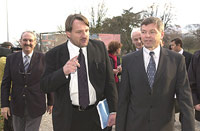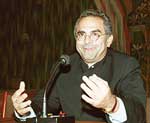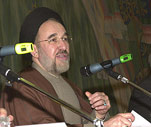|
|
MANDATE AND METHODS
The mandate of the International Affairs, Peace & Human Security team is to provide WCC staff and governing bodies, member churches, national and regional ecumenical organizations and other international Christian bodies with information and guidance on international problems.
The purpose of the team, outlined in our by-laws, is to help "formulate the Christian mind" and "bring that mind effectively to bear" upon these issues.
How we work
The International Affairs, Peace & Human Security team's work consists of two interrelated parts:
The first part is to inform and address public issues that have a claim on the Christian conscience. We monitor, analyze and provide information on international political trends - for example on global security, reform of the UN and other international institutions, the applicability of sanctions - and on critical situations like Jerusalem and Middle East peace, Iraq, East Timor and Sri Lanka, Sudan and the Great Lakes region of Africa, the former Yugoslavia, Colombia and Central America. |

Above: Norwegian prime minister Rev. Kjell Magne Bondevik (right) arriving at the Ecumenical Centrer with WCC International Affairs director Peter Weiderud (2003) |
Below left:
Visit to the WCC of Nobel Peace Prize laureate from East Timor, José Ramos-Horta (2000)
Below right: President H.E. Mohammad Khatami (Iran) visits the World Council of Churches to speak on Interreligious Dialogue and International Relations (2003) |
 |
 |
|
We assist the WCC general secretary in preparing public statements, appeals to state authorities and messages of support and solidarity to churches and others engaged in struggles for justice and peace. We help the WCC governing bodies identify challenges to the churches and to guide them to shape a coherent ecumenical response.
We provide a platform for information-sharing and joint advocacy on critical situations of human rights violations and conflicts, and on opportunities to support peacemaking initiatives.

The second part of our work consists of programme activities in the fields of:
human rights and religious freedom
disarmament and arms control
peace and conflict resolution
global governance, including UN relations, and
impunity, truth and reconciliation
In each of these areas, the International Affairs, Peace & Human Security team offers an ecumenical forum, information and guidance and leadership on national and international problems to WCC member churches, their agencies and other ecumenical partners.
We maintain consultative relations with the UN and its related agencies, and coordinate representation of the WCC, member churches and partners to these bodies. And we provide services to the Commission of the Churches on International Affairs.
Our work methods include:
monitoring, analysis and interpretion of international political trends and developments;
formulating proposals for policy, advocacy and action;
interpreting WCC policy to the media;
promoting and supporting actions of solidarity with victims of injustice, violence and displacement;
fact-finding and pastoral visits;
promoting better international standards;
enabling ecumenical consultations on critical issues and situations and for theological-ethical reflection;
intervening with governments and intergovernmental bodies on behalf of churches and ecumenical partners, and assisting churches in their relations with states;
acting through a WCC liaison office at the UN in New York and UN representation in Geneva and providing for liaison with other UN offices;
developing ecumenical responses to what intergovernmental bodies say and do;
channelling resources to human rights, peace and conflict resolution ministries, servicing regional working groups and organizing training and capacity-building opportunities.
These are continuing activities. We also have some time-limited projects on:
what churches, ecumenical and interfaith groups are doing in conflict transformation and mediation - in the context of the Decade to Overcome Violence (2001-2010);
small arms control and alternative approaches to international security;
nuclear weapons disarmament;
the development of new non-military approaches to international security.
|












